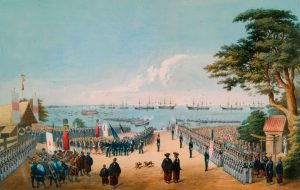Events and Activities
Revolution and Empire: the Northern Expedition in the Japanese Press, 1926-28

With the Northern Expedition (1926-28), the Nationalist Party (GMD) emerged in China as the leading force for reunification of the country. The foreign powers had thus to face a new government in Nanjing that claimed back for China the sovereign rights it had lost with the ‘unequal treaties’ in the late Qing period. To Japan, in particular, the establishment of the Nationalist regime posed a threat to its ‘special interests’ in Northeast China.
Historians have studied extensively the political process that in 1931 led to the Japanese invasion of Manchuria, taking into account both domestic conditions and the wider international context. Public opinion in Japan, however, has remained rather on the sidelines of research.
Picture: CC BY-SA 3.0 | Source
Demographischer Wandel als kommunalpolitische Herausforderung – Lösungsstrategien japanischer und deutscher Gemeinden

Der durch niedrige Geburtenraten, einen steigenden Anteil älterer, vor allem auch pflegebedürftiger Personen und einen Rückgang der Bevölkerung gekennzeichnete demographische Wandel trifft die Gemeinden in besonderem Maße. Hier wird auch die Komplexität der Herausforderung deutlich.
Unsere Konferenz wird diese demographische Herausforderung am Beispiel japanischer und deutscher Gemeinden erörtern sowie konkrete Lösungsstrategien auf nationaler wie auf lokaler Ebene vorstellen und diskutieren.
Seoul’s Namsan under Japanese Influence – Japanese Ritual Life and Assimilation Policy in Korea, 1890-1945

Namsan is a small mountain in central Seoul. It was used for propaganda both by the Japanese who settled there in the 1890s and by Koreans until the democratization of South Korea in the 1980s. However, as Namsan nowadays has become a famous leisure attraction for tourists as well as locals, the fact that it has a troubled and politically charged history is mostly forgotten.
This talk outlines the changes on Namsan around the period of Japanese rule. During that time, Shintō shrines and Buddhist temples were continuously built on and around Namsan, turning it into the center of Japanese ritual life. At the same time, by removing traditional Korean ritual sites, Koreans were estranged from their own spiritual traditions. From 1925, when the Japanese Government and the Government-General of Chōsen decided to build Chōsen Jingū on Namsan, the issue of Koreans visiting Namsan and taking part in Japanese ritual life became even more politicized. As a result, Namsan was slowly turned into a space of assimilation of Koreans into Japanese – a development that reached its pinnacle when Koreans were forced to pray at shrines during the wartime years.
Living Diversity: A Comparative View on Identity, Gender and Sexual Orientation in Contemporary Japan and Germany

Homogeneity is a myth. Diversity, on the other hand, has become a buzzword in Japan and elsewhere. It can be understood as both a chance for society to become more open and tolerant, or as a risk to grow heterogeneity and inequalities.
This panel discussion will reflect what diversity means for a society and how this is connected to the reality of everyday life. By focusing on issues of identity, gender and sexual orientation in Japan, Germany and beyond, we bring together two activists and a scholar who address multiple dimensions of diversity.
Culture at work. On the interplay of cultural change and job satisfaction in a Japanese multinational company

Job satisfaction in Japan has become a widely-debated issue, especially since research findings indicated that it ranks among the lowest in the world (e.g. Hipp and Givan Kolins 2015).
Moreover, surveys suggest that compared to other aspects of life, such as family or education, Japanese are least satisfied with their working lives (Holthus et al. 2015).
At the same time, global megatrends and market forces are reshaping Japanese workplaces, for example in the form of international mergers and acquisitions, which lead to direct confrontations of different cultures and elicit inevitable changes to the existing work culture. So far, however, the implications of such changes for organizational cultures and employee satisfaction have rarely been addressed in qualitative research. My study aims to provide a deeper understanding of the interrelations between job satisfaction, globalization and culture and asks to what extent job satisfaction interacts with and depends on culture.
Joint Exposition of Books
The Bakumatsu – the end of the Edo period

150 years have passed since the Taiseihōkan, the return of rule to the Emperor from the Shoguns.
In the exposition, materials on the history of foreign relations from the arrival of Commodore Perry in 1853 to the Taiseihōkan in 1867 are displayed.
For further information on the exposition, please contact each library.
Humans & Machines in Medical Contexts: Case Studies from Japan

Medical instruments and technologies can be used to manipulate the human body, ranging from general devices with extremely low risk to such ones highly invasive to patients. Many technologies and electronic appliance nowadays in use; however, took their roots in the second half of the 19th century and increasingly merged into clinics and hospitals during the following century. At present, there can be observed a thrust of technological progress at high pace in the field of biomedical engineering and medical informatics, which contribute additionally to new configurations in in the human-device interplay in Japan.
In order to explore the issues arising from the clinical practices vis-à-vis applications of the (then new) medical devices”, the workshop casts light on their various aspects. The participants will address features regarding the historical, legal, socio-structural, engineering and bioethical conditions and consequences of the interplay between humans and medical technologies or instruments, respectively health care practices in contemporary Japan.
Towards an Intellectual History of Japan’s 1980s Bubble Culture and Economy
In the popular imagination of contemporary Japan, the so-called ‘Bubble Economy’ of the late 1980s has become a place of nostalgia by itself. In it, the 1980s live on as a spectacular feast with endless excitement and seemingly bottomless resources, while contemporary Japan seems mired in dearth and boredom of the everyday. Of course, things were not quite what they seem, as 1980s Japan was also a deeply neurotic society, beset by anxieties and fears that were shared by many cold-war societies, but in part also entirely local. Thus, studies of the culture of the period either focus on the sense of loss and of nostalgia for vanishing traditions (whatever their claims to authenticity) or on the relentless commodification that went hand in hand with it but seemed strangely disconnected.











 Open Access
Open Access
